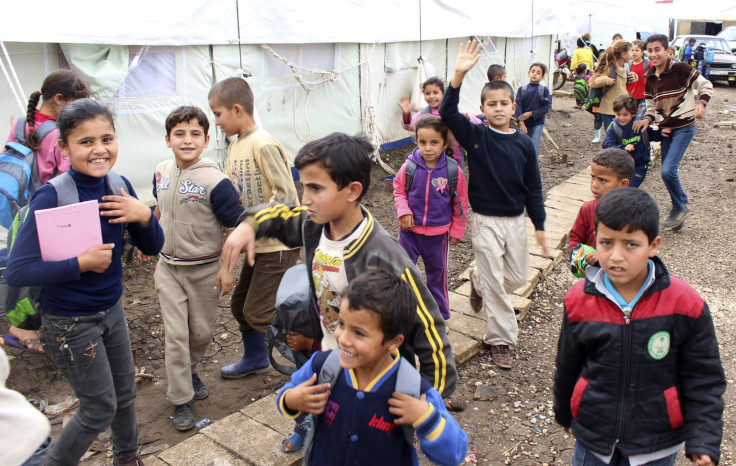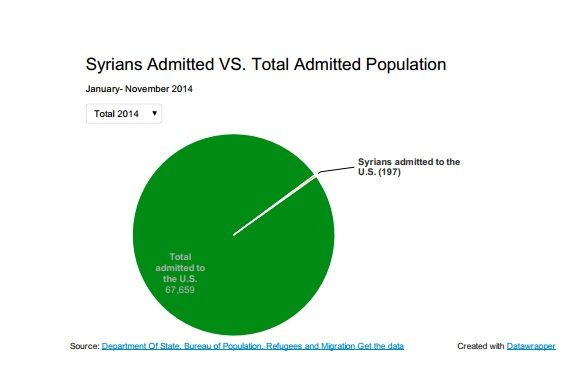US Vetting 9,000 Syrian Refugees To Weed Out Jihadists Before Granting Asylum

As the number of people forced by the Syrian civil war to flee the country surpasses 3 million, the United States is planning to boost the number of Syrian refugees it's accepting as asylum seekers. But for the average Syrian, being granted refugee status in the U.S. is still a long shot, as authorities subject candidates to a lengthy vetting process to ensure they are not affiliated with terrorist groups.
The U.S. has accepted a mere 284 Syrian refugees since October 2011, almost 40 percent of them in the last three months. That number is expected to surge next year for the first time since the start of the civil war in 2011, possibly reaching into the thousands.
The U.S. Refugee Admissions Program is already reviewing 9,000 cases referred by the United Nations High Commissioner for Refugees (UNHCR), and receives about 1,000 new cases a month.

Syria’s civil war has transformed the country into a breeding ground for extremist groups like al Qaeda affiliate Jabhat al-Nusra and the so-called Islamic State, and has become the “humanitarian challenge of our times,” according to the United Nations. Though the need to resettle victims of the Syrian conflict has passed the point of urgency, the challenge to ensure militants don’t slip across the border masquerading as refugees is greater than ever. The U.S. hopes to avoid this possible infiltration by putting potential refugees through a rigorous, multipart vetting process that could take up to two years to complete -- and doesn’t include Syrians displaced within their country, only those who fled abroad.
Neighboring countries like Lebanon, Turkey and Jordan have taken in more than 3 million refugees and in recent months have cracked down on the flow over their borders because of the enormous financial and security burden. To help lighten that load, the U.S. said it would “lead” the initiative, expecting the number of Syrian refugees in the country to increase by thousands -- but only through a process involving referral by the UNHCR, which would shoulder a part of the security burden.
Who Are the Refugees?
Twenty-eight countries agreed Tuesday to resettle nearly 100,000 Syrians referred by the United Nations. The U.S. is among them.
The UNHCR only began making referrals to the U.S. in mid-2014, according to the State Department. However, it did refer a small number of “particularly vulnerable Syrian refugee cases” in 2013.
“We normally receive the majority of worldwide refugee referrals from UNHCR, and expect this will be the case with Syrians as well,” a State Department official who asked to remain anonymous said, adding that the process works only for very few people, anywhere in the world. “Only a tiny percentage of all refugees are resettled in a third country,” the official said.
In addition to the more than 3.2 million registered refugees in neighboring countries, there are 12.2 million people in need of humanitarian assistance within Syria, according to the U.N. At least 7 million are displaced within the country and the majority will never be resettled in another nation.
Internally displaced persons (IDPs) are not eligible for the UNHCR referral program, which means most of the cases that will get to the State Department are of Syrians who have already fled and are living in refugee camps. Conditions in the camps in Turkey, Lebanon and Jordan have become dire. And while it is essential for the international community to lighten the countries’ load and provide better living conditions for refugees, the camps also present a significant threat.
Security Burden
Many Syrian refugees are fleeing active conflict zones and lack the proper paperwork to register in a different country, according to a recent U.N. report. What’s more, the huge influx of refugees into some countries has made it almost impossible to weed out possible militant infiltration, and the poor living conditions combined with government crackdowns have left refugees frustrated.
Lebanon, for example, has taken in at least a million refugees, which has a “destabilizing effect” on the country, according to the Lebanese prime minister. Most refugees settled in Arsal on the Syrian border, which has become a hotbed of militant activity and sees frequent clashes between jihadist fighters and the Lebanese armed forces.
“Everyone is feeling that the threat is overwhelming,” Imad Salamey, a professor at the Lebanese American University and author of “The Government and Politics of Lebanon,” recently told International Business Times. “Syrian refugees could include fighters, which would create significant insecurity for the country.”
Those who do hope to resettle must register with the UNHCR bureau closest to their camp; U.N. personnel there act as the first vetting system to weed out fraudulent cases. However, despite the UNHCR’s “zero tolerance” policy, “resettlement activities are particularly vulnerable to fraud because of the benefits they offer ... and fraud can occur almost anywhere,” according to the organization’s resettlement handbook.
U.S. Vetting Process
The UNHCR referral is a crucial first step to gaining admittance to the U.S., but the candidate must then pass “the highest level of security checks conducted on any category of traveler to the United States,” a State Department official said.
The vetting process is a multistep procedure that involves several government agencies, including three cabinet-level departments (State, Homeland Security, Defense) plus the National Counterterrorism Center and the Terrorist Screening Center.
The State Department will first collect biographical information about the candidate and determine whether they qualify for refugee status. The average Syrian would satisfy nearly every point in the U.S. definition of a refugee with a possible exception for those who have already “firmly resettled" in another country.
The case is then passed to the Department of Homeland Security, which will send a representative to conduct an in-person interview to further screen the applicant for security concerns and to determine whether the applicant is otherwise admissible, a State Department official said. However, "security concerns" in countries like Syria, Iraq and Lebanon have in some cases prevented DHS officials from traveling for “several years,” according to the White House Proposed Refugee Admissions report for fiscal year 2015.
The process can take up to two years, but an expedited process is available for those whose lives are deemed “at serious risk.” The State Department expects to see the first wave of UNHCR-approved refugees to be resettled in the U.S. next year.
Other countries continue to increase their intake of Syrian refugees. But nearly four years into the civil war, “the refugee crisis caused by the conflict in Syria is the worst the world has witnessed in a generation,” according to the White House report.
© Copyright IBTimes 2025. All rights reserved.





















